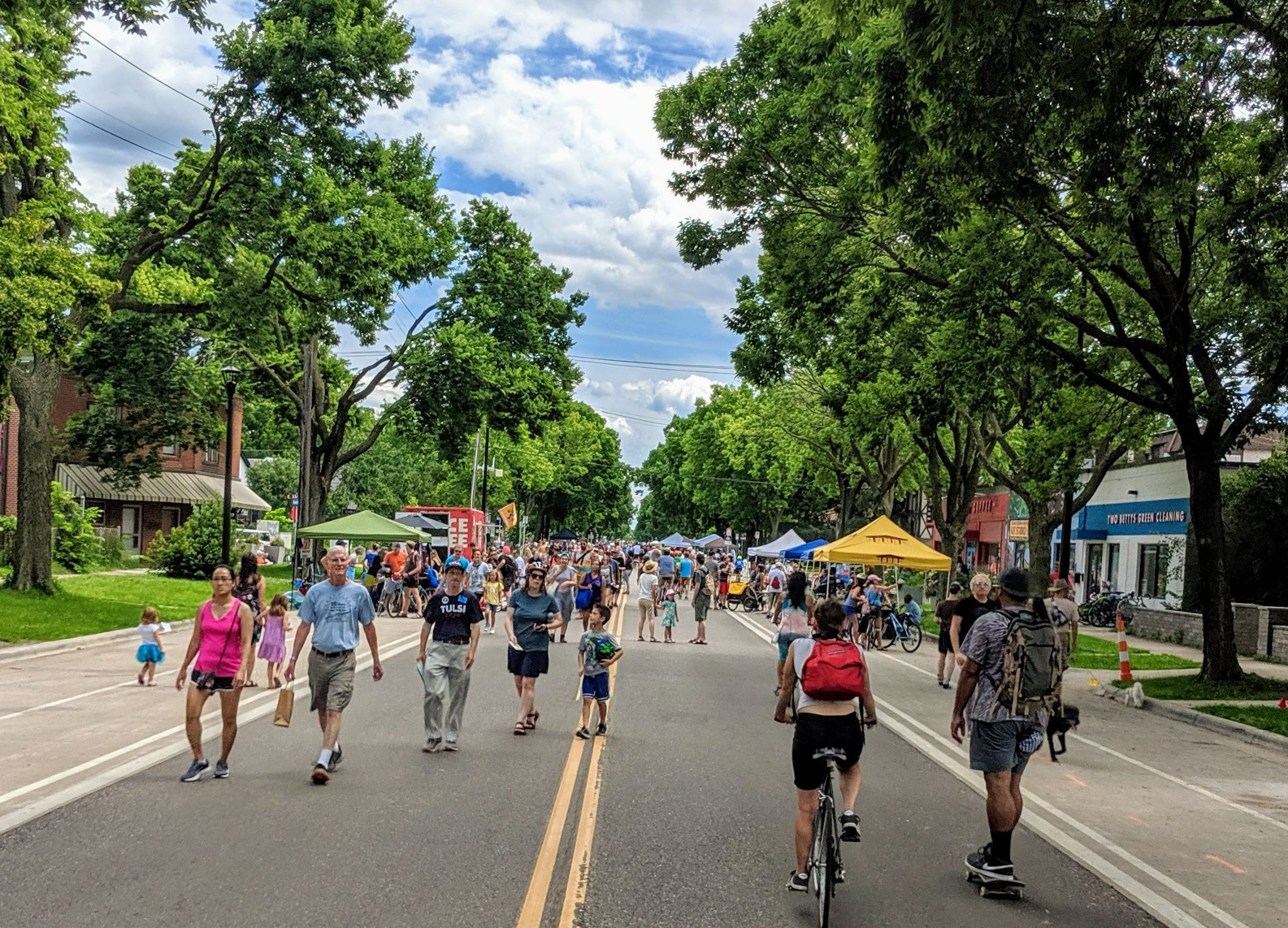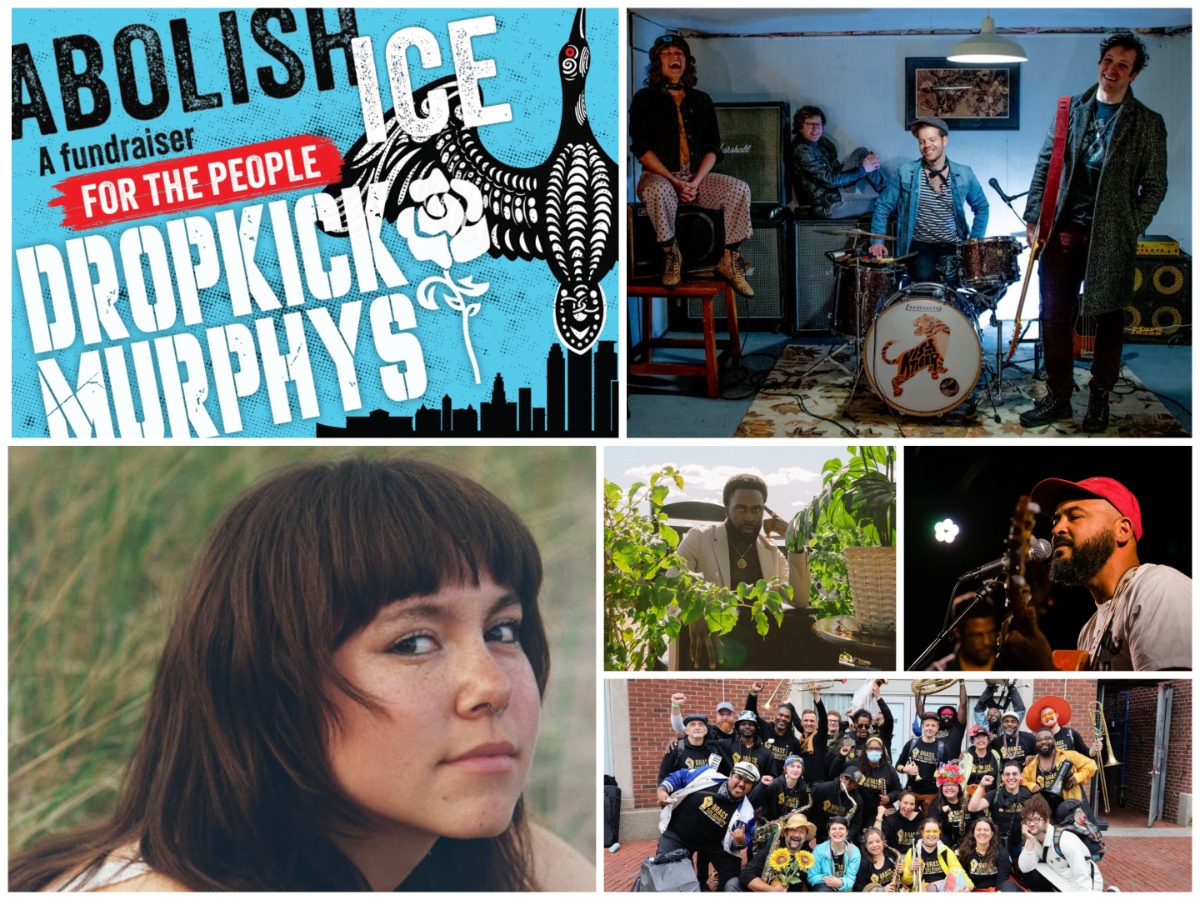Welcome back to The Flyover, your daily digest of what local media outlets and Twitter-ers are gabbing about.
We Asked the Leader of Our Streets Minneapolis About the City's Puzzling Statement
This morning the Star Tribune ran a story about the uncertain future of Open Streets Minneapolis, the annual car-free neighborhood festival series that nonprofit advocacy group Our Streets debuted in 2011. Long story short: About a week after Our Streets asked the city for $851,000 to organize and operate Open Streets in 2024 (it currently receives no funds), the nonprofit's executive director, José Antonio Zayas Cabán, discovered from Council Member Robin Wonsley's Friday newsletter that the event's future is in danger.
Then, today via the Strib, the city released a statement that read, in part, "by mutual agreement, the city and Our Streets will not be extending the current contract for Open Streets events for 2024." But Zayas Cabán says his org hasn't had any conversations about the '24 season with the city, calling that part of the statement "1,000% not true." (You can find a more detailed account of the situation in a statement Our Streets released this afternoon.)
We asked city PR rep Sarah McKenzie to explain her apparent fabrication, and she directed us to a slightly rephrased statement that included: "by mutual agreement the city and Our Streets will not be extending the current $0 contract for the 2024 Open Streets season." We followed up, asking specifically about the strongly and publicly disputed "mutual agreement" line, but didn't hear back. (The Strib has since removed that bit from its story, for whatever reason.)
We were able to connect by phone with Zayas Cabán, who had plenty to say.
So, to begin, what the hell is the city talking about?
My thoughts exactly, I think that’s a good way to start the article [laughs]. Open Streets, to us, is an event program that allows us to display the potential for streets when you prioritize people instead of vehicles. The other thing that’s confusing and disappointing is, this year we’ve had a particularly special set of events. The event series is an opportunity to bring programing to communities that would not otherwise be able to afford doing it for themselves, that have been marginalized or forgotten.
It’s representative of the same communities that are prioritized in the Transportation Action Plan, this so-called call for racial and class equity. Our three events this year have been in Near North, North, and Cedar-Riverside. That was not happenstance. To have the event potentially canceled forever? It’s really disheartening, and the way it has been done is making things murky. They said we’re in agreement not to do 2024, which is not true; we’ve not even spoken about it. And they’re saying the event series would be able to continue, they just wouldn’t be supporting it. It would be devastating to lose Open Streets, but we can’t do it for zero dollars. And the city knows that.
Tell me about the $851,000 figure you requested from the city to fund Open Streets.
If we keep giving them free labor we’re just not going to be able to continue. We’ve been asking the city of Minneapolis for funding for several years. They’ve never answered that call. In my opinion, it should have never been unpaid. I’m a Grammy-nominated professional musician in another life. I love playing my instrument, but if I do it for free, I’d run out of money. We’re providing a good service, we’re doing it very well, and compensation on a base level is fair and important. We’d like to, ideally, scale this up to 10 events because we now know we have something good that people love and want. They obviously don’t want to fund the program, but the way they've gone about it is odd.
In their statement, the city said the Public Works Department wants to shift to events with a more of an explicit emphasis on walking, biking, and transit… how much more explicit can your event be?
It couldn’t be more explicit. Our event goes even further, because it focuses on the communities that are most impacted by these infrastructure decisions. They know we’re hosting events in places that have the greatest needs from the priorities in the Transportation Action Plan. We couldn’t get any closer to that. For them to say something like that? It’s a direct contraction.
Can you explain the “mutual agreement” part of the city's statement to me?
It’s 1,000% not true. We’ve not had a conversation about it. What’s very bizarre about it is, Sarah is someone we work with throughout the event series. We’ve not gotten a single email from Sarah about the 2024 series. My perception is they were hoping this would happen more quietly. It has become something more. The way that they’re floating it—“well, Open Streets won’t go away...” like a neighborhood organization could apply to do it? That emphasizes the racial and class equity problem. If it’s not funded, only wealthy neighborhoods could possibly pick up the event series.
It was hard for me to not think about the old Nice Ride program going away, where the city could have theoretically helped save something useful that also reduces dependency on cars.
You’re absolutely right. Sometimes it seems the programs that fall by the side are the ones that most directly correlate with positive impacts in communities that need it the most. There’s a reason why the state of Minnesota has one of the worst racial equity gaps. I meet a lot of people who are like, “Oh it’s a great city for biking…” Yes, for certain ethnic groups of a certain affluence. We should afford those things to all community members.
What’s your best guess for the future of Open Streets?
I’m really optimistic. My hope is that the city of Minneapolis has a change of heart, and that the City Council listens to its constitution and funds the program. I’m going to continue to push for Our Streets to lead those events into the future.
Is it challenging to operate in good faith after… just being lied about, I guess?
One of my mentors in politics, Cornel West, always says, “It’s about truth and justice, it’s about the quality of your courage as it relates to poor and working people–are you ready for the long run?” We want to be known for being willing to go through these tough spots, because we believe in the communities we’re advocating for no matter how difficult it is.
Former Warlord Campaigns for Chaotic Local Candidate
Many raised an eyebrow when supporters of Nasri Warsame, a candidate running for the DFL's City Council nom, stormed the stage and got physical at May’s endorsement conference. Well now the other eyebrow is going way way up, because while Warsame is banned from any kind of DFL endorsement, he has received a thumbs up from former Somali warlord Hussein Farrah Aidid. “It’s reflective of the dark time,” former U of M instructor Salah Ahmed tells Deena Winter at Minnesota Reformer of this era in Somali history, “when the warlords were in action and many people suffered.” You might remember Aidid's father, Mohamed Farrah Aidid, for his 1990 coup, which led to nationwide famine, attacks on U.N. peacekeepers, and the U.S./Somali Battle of Mogadishu, a situation covered in the book/movie Black Hawk Down. When Mohamed died from battle wounds, his son, Hussein, was named his successor. While Hussein says he took a more diplomatic approach than his father, critics are quick to point out that he was more of a flip-flopper, and many public executions were held under his rule before he stepped down and fled the country.
St. Paul Subsidizing Office Space Conversions
Despite the best efforts of businesses to haul employees back to the office, work from home is here to stay. That leaves a mess of big buildings sitting unused downtown—a particular problem in St. Paul, where commercial real estate was already struggling pre-pandemic. As Bill Lindeke writes in MinnPost, the city has turned to tax-increment financing, better known as TIF, to subsidize the Landmark Towers project on Rice Park, where commercial space is being converted to residential space. That’s not how TIF usually works. As the name suggests, the idea is that the city’s subsidy will be paid for in the future by an increase in tax revenue, and since residential property is taxed at a lower rate than commercial, that’s not the case here. Nonetheless, the St. Paul City Council decided that a $26 million outlay is worth the addition of 180 new apartments in the heart of the city. Sherman Associates, the developer behind Landmark Towers, is also transforming office space in Minneapolis's Northstar East building to 216 apartments, a project paid for in part using affordable housing tax credits.
It’s Curtains for St. Cloud State Theater Program
St. Cloud State University has seen better days. Enrollment has dropped by more than a third since 2010 (that’s 6,000 fewer students) and the university now faces a $24 million shortfall. These developments have led to drastic cuts—including the complete elimination of the theater department. “In the last 20 years [students] started majoring in business,” Bradley Chisholm, chair of the theater department, told MPR News. “They started majoring in fields that were associated with for-profit companies.” A decrease in funding for the department led to faculty going elsewhere; their positions weren’t filled, leading to a further decrease in funding. Just another example of the transition of colleges from institutions that provide an education to factories that churn out employees for the workplace.






